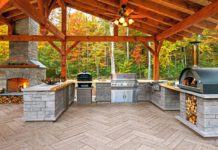There cannot be a debate to crown a winner between quartz and natural stone countertops. Both present numerous advantages. Comes the time to pick yours, after ranking in terms of durability, resistance, and maintenance levels, your style and lifestyle will be the factors tipping the balance.
What Are Natural Stone Countertops
Natural stones are directly quarried in large slabs before undergoing the polishing process that will reveal their designs, coloring, veining, even fossils.
The most popular stones used in kitchen design include
- granite
- limestone
- slate
- soapstone
- marble
- travertine
They are more durable than most countertops materials but present different needs in terms of care and maintenance. In general, natural stones are resistant to heat and stains and easily restored in case of chips or scratches.
Stain Resistance Ranking from Best to Poorest
- slate
- soapstone
- granite
- marble
- limestone
- travertine
To increase the lifetime value of your countertops, professional installers recommend applying a sealant regularly.
Resistance to Scratches from Best to Poorest
- granite
- slate
- marble
- limestone
- travertine
- soapstone
One factor that can weigh heavily on your selection is the price. Due to the cost of quarrying and labor-intensive fabrication and installation (not to mention shipping), natural stone can significantly add to the kitchen remodel budget.

Is Quartz Right for Your Kitchen?
Quartz countertops are engineered from quartz crystals, color pigment, and a resin binder. There is virtually no limit in the choice of colors, from understated white to hot red, though deeper colors may fade if exposed to direct sunlight or very hot pans. As such, quartz is not suitable for outdoor kitchens.
Unlike natural stones, once polished and installed quartz countertops need no sealing.
As a nonporous material, quartz resists stains and acids and does not promote the proliferation of viruses or bacteria.
How Do those Materials Compare when in Use?
Of all the things that happen in a kitchen, which material takes the gold?
- Strength: quartz
- Ease of cleaning: both
- Low maintenance: quartz
- Scratch resistance: quartz
- Stain resistance: quartz, even acidic spills like lemon juice or tomato sauce
- Cost: both could lose, though brands are offering more and more affordable options if you’re not picky for design
Kitchen countertops are arguably the most important element of the room: they finish the design, tie the layout and cabinets together, and are the surfaces where your kitchen stands the most use, from food prep to family meals. If you are remodeling, or are considering a kitchen upgrade, take enough time to consider your needs, how much you want to spend, and get samples. You can test the look and feel before committing for years.








































